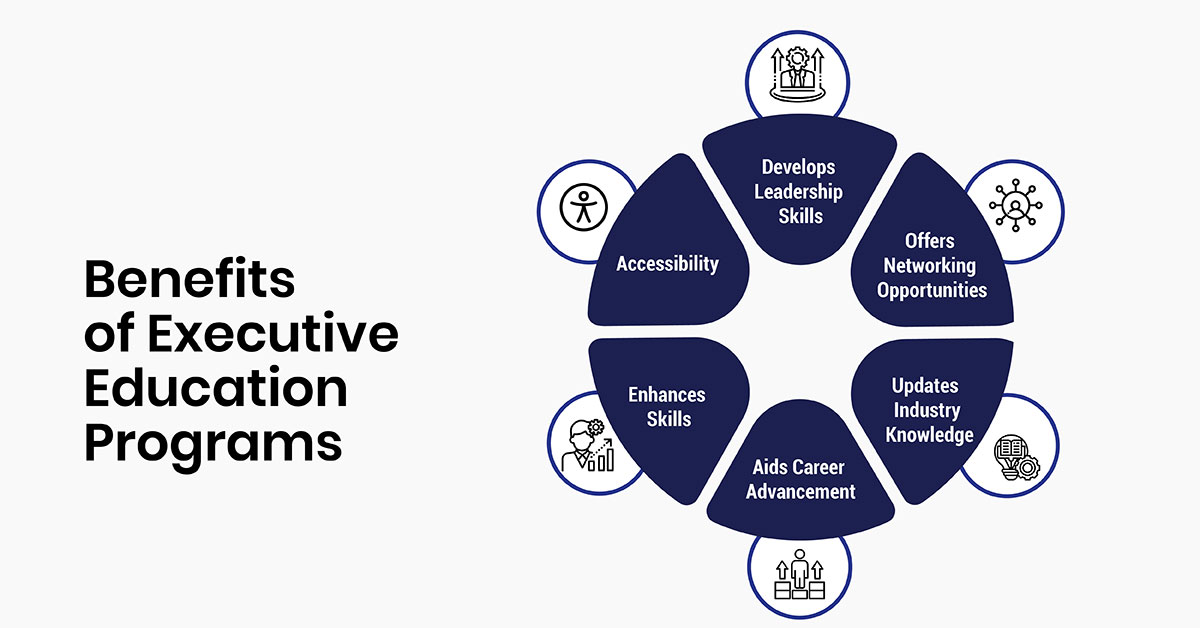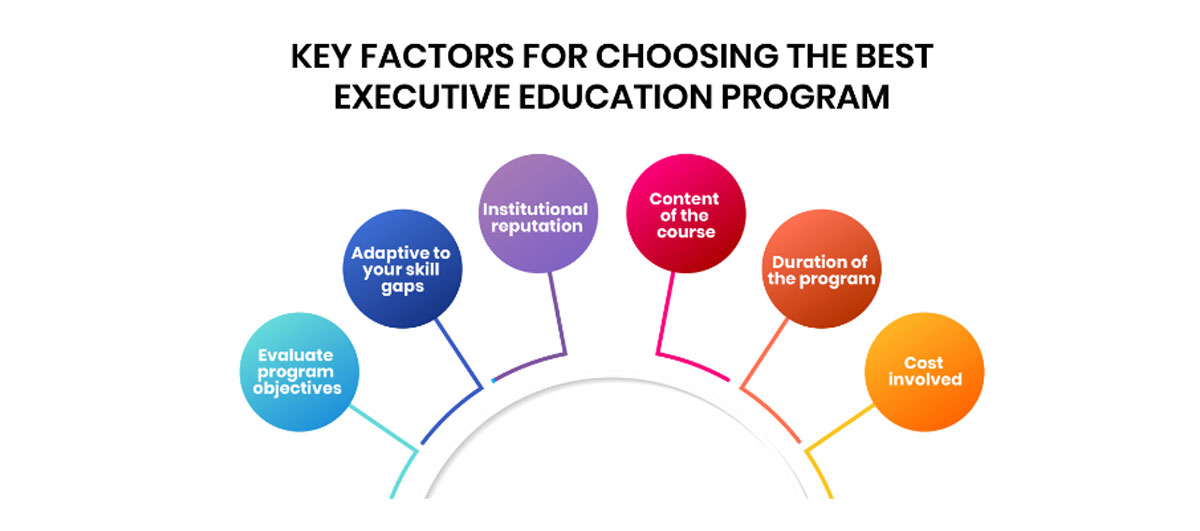Leadership Mastery: Elevate Your Skills with Executive Education Programs
May 17, 2024Today's business world demands continuous learning, fueling a surge in executive education programs. Through executive education programs, professionals not only gain practical business acumen but also crucial life skills, particularly in leadership. These specialized initiatives empower leaders with crucial skills and insights, ensuring they stay ahead in dynamic markets.
Moreover, executive education fosters invaluable networking, connecting participants with industry peers. Executive education is indispensable for professionals navigating today's competitive landscape, offering a pathway to sustained success.
Understanding Executive Education Programs
Executive education programs, often offered by prestigious business schools and universities, are tailored short-term courses aimed at professionals seeking to enhance their career prospects and refine their leadership skills. These programs serve as intensive learning experiences designed to equip participants with practical knowledge applicable to their roles and industries.
One notable feature of executive education programs is their adaptability to a global audience, catering to diverse professionals from various sectors. These courses are meticulously crafted to meet the specific needs of corporate clients, ensuring relevance and effectiveness in addressing contemporary challenges.
Participants in these programs can expect to delve into a range of critical concepts, including organizational leadership, change management, innovation, and strategic development. By immersing themselves in these topics, professionals can enhance their abilities in key areas such as leadership, marketing, and networking, thereby strengthening their competitive edge in the job market.
Likewise, executive education programs offer specialized tracks built for different industries and sectors, allowing participants to focus on areas relevant to their career aspirations. Whether it's talent management in healthcare, data science in technology, or strategy development in finance, these programs provide targeted learning opportunities to address specific professional needs.
In addition to covering foundational knowledge, these programs also delve into advanced topics, keeping participants abreast of cutting-edge technologies and industry trends. This ensures that professionals not only acquire essential skills but also stay ahead of the curve in rapidly evolving sectors.
Besides, executive education courses offer enriching and hands-on learning encounters, empowering participants to immediately apply their acquired expertise within their organizational settings. By engaging in case studies, interactive workshops, and real-world applications, professionals acquire actionable insights that yield concrete outcomes in their professions.
These programs also offer flexibility, often incorporating multi-modal learning approaches to accommodate diverse learning styles and schedules. Whether through in-person sessions, online modules, or self-paced learning options, participants have the flexibility to tailor their learning experience to suit their preferences and commitments.
Executive education programs serve as invaluable resources for professionals seeking to elevate their careers and stay ahead in today's competitive business landscape. By providing targeted, practical learning opportunities, these programs empower individuals to unlock their full potential and drive meaningful impact in their respective fields.
Merits of Executive Education Programs
Executive education programs offer a myriad of benefits for professionals across various industries, ranging from developing leadership skills to expanding professional networks and staying updated on industry trends.
Here's a comprehensive overview of the top advantages associated with attending executive education programs:

-
Develops Leadership Skills
These programs provide a platform for professionals to enhance crucial leadership qualities essential for motivating teams, driving change, managing large teams, and making informed decisions. Participants learn from seasoned business professionals, gaining insights into the latest industry practices to succeed in current and future roles. -
Offers Networking Opportunities
Executive education programs bring together professionals from diverse backgrounds and industries, fostering invaluable networking opportunities. Interactions with like-minded peers enable the exchange of experiences, success stories, and fresh business ideas, paving the way for collaboration and mutual development. -
Updates Industry Knowledge
Remaining informed about the latest industry norms and methodologies is vital for professional growth. Executive education programs offer access to top faculties and industry experts, allowing participants to stay updated on emerging trends and gain new skills, thus maintaining a competitive edge in the job market. -
Aids Career Advancement
Participation in executive education programs demonstrates a commitment to continuous learning, enhancing job prospects and making candidates stand out to employers. The acquired skills and knowledge serve as valuable additions to resumes, positioning individuals as highly skilled and proficient candidates for coveted roles. -
Enhances Skills
These programs focus on honing practical business skills and enhancing core knowledge, enabling professionals to perform effectively in their respective workplaces. By providing immersive learning experiences, executive education programs empower participants to apply newfound knowledge directly to real-world scenarios, driving tangible results. -
Accessibility
Executive education programs are increasingly offered online, ensuring accessibility to professionals regardless of geographical location or scheduling constraints. The flexibility of online learning allows participants to tailor their learning experience according to their convenience and pace, facilitating seamless skill development and career advancement.
Executive education programs facilitate career advancement by showcasing a commitment to lifelong learning and professional growth, developing individuals as competent and highly skilled candidates for sought-after positions. These programs offer accessible and flexible learning opportunities cultivated to the needs of busy professionals, empowering them to excel in today's rapidly evolving business landscape.
Choosing the Best Executive Education Program
Choosing the best executive education program is a crucial decision that can significantly impact your career trajectory and professional growth.
With a multitude of options available, it's essential to consider several key factors to ensure that the program aligns with your goals and objectives effectively.

-
Evaluate program objectives
First and foremost, evaluate the program's objectives and ensure they align closely with your personal and professional aspirations. -
Adaptive to your skill gaps
Look for a program that addresses your specific skill gaps and provides the necessary resources and information to help you succeed in your desired field. Whether you're aiming to enhance your leadership abilities, sharpen your strategic thinking, or gain expertise in a particular area, selecting a program made for your needs is paramount. -
Institutional reputation
Institutional reputation plays a pivotal role in the quality and credibility of an executive education program. Opt for programs offered by renowned business schools or colleges with a track record of delivering top-notch curricula recognized by businesses worldwide.A reputable institution not only ensures the quality of education but also enhances your credentials and marketability in the job market.
-
Content of the course
Course content is another critical consideration when selecting an executive education program. Review the syllabus to ensure it covers current and relevant material applicable to your field and job responsibilities.Look for programs that strike a balance between theory and practical applications, incorporating real-world examples, case studies, and hands-on learning experiences to provide a comprehensive learning experience.
-
Duration of the program
Consider the time commitment required for the program and ensure it aligns with your professional and personal obligations. Executive education courses vary in duration, ranging from a few days to several weeks.Choose a program that allows you to manage your workload effectively and fits seamlessly into your schedule without compromising other commitments.
-
Cost involved
Cost is a significant factor to consider when investing in an executive education program. While these programs offer significant returns in terms of career advancement and skill development, it's essential to assess whether the program's cost aligns with your budgetary constraints.Evaluate the program's value proposition and weigh it against the tuition fees to make an informed decision.
By choosing a program that aligns with your goals and objectives, you can maximize the benefits of executive education and enhance your career prospects effectively.
Conclusion
Executive education programs offer professionals a pathway to continuous learning and career advancement in today's dynamic business environment. By offering better learning experiences, nurturing essential skills, and providing access to invaluable resources, these programs empower individuals to navigate industry challenges with confidence and adaptability.
Embracing its potential empowers professionals to stay ahead of the curve, excel in their respective fields, and achieve sustained success in their careers.




